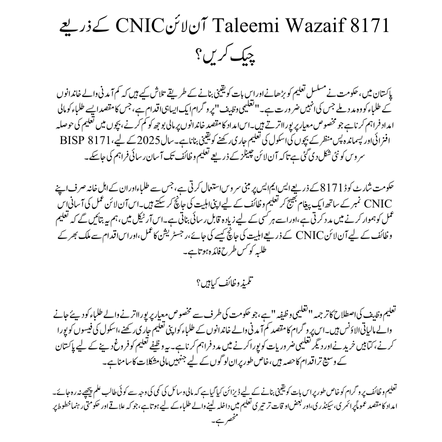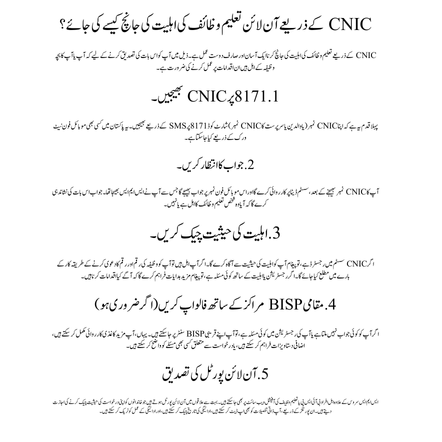Table of Contents
Toggle8171 Taleemi Wazaif Check Online by CNIC?
In Pakistan, the government has consistently sought ways to enhance education and ensure that students from low-income families receive the support they need. The “Taleemi Wazaif” programis one such initiative, aimed at providing financial assistance to students who meet certain criteria. This aid is meant to help ease the financial burden on families, encouraging education among children and ensuring that children from disadvantaged backgrounds continue their schooling. For the year 2025, the BISP 8171 service has been revamped to provide easier access to the Taleemi Wazaif (education stipends) through online channels.
The government uses an SMS-based service through short code 8171, allowing students and their families to check their eligibility for the Taleemi Wazaif by simply sending a message with their CNIC number. The ease of this online process helps streamline the process, making it more accessible for everyone. In this article, we will break down how to check eligibility for the Taleemi Wazaif online via CNIC, the process of registration, and how this initiative benefits students across the country.
What Are Taleemi Wazaif?
The term Taleemi Wazaif translates to “Educational Stipends,” which are monetary allowances given by the government to students who meet specific criteria. The purpose of this program is to assist students from low-income families in continuing their education, covering school fees, buying books, and meeting other educational needs. These stipends are part of Pakistan’s broader initiative to promote education, especially among those who face financial constraints.
The Taleemi Wazaif program is specifically designed to ensure that no student is left behind due to a lack of financial resources. The assistance is generally aimed at students enrolled in primary, secondary, and sometimes tertiary education, depending on the region and government guidelines.
How Does the 8171 Taleemi Wazaif Program Work?
The 8171 Taleemi Wazaif program works through a short code system. By texting your CNIC number to 8171, the system will automatically check your eligibility for the stipend. The system is managed by the Benazir Income Support Program (BISP), which oversees the distribution of financial aid to the deserving citizens of Pakistan.
The eligibility is determined based on several factors such as income levels, family background, and whether the student is enrolled in a government-recognized educational institution. It is designed to ensure that the financial aid reaches the students who need it most.

How to Check Eligibility for Taleemi Wazaif Online by CNIC?
Checking eligibility for Taleemi Wazaif via CNIC is a simple and user-friendly process. Below are the steps you need to follow to verify if you or your child is eligible for the stipend:
1. Send CNIC to 8171
-
The first step is to send your CNIC number (or the CNIC number of the parent or guardian) to the short code 8171 via SMS. This can be done through any mobile phone network in Pakistan.
2. Wait for the Response
-
After sending your CNIC number, the system will process the data and send a response to the mobile phone number from which you sent the SMS. The response will indicate whether the individual is eligible for the Taleemi Wazaif or not.
3. Check Eligibility Status
-
If the CNIC is registered in the system, the message will inform you of the eligibility status. You will be notified about the amount of the stipend if you qualify and the procedure to claim the amount. If there are any issues with the registration or eligibility, the message will provide further instructions on what steps to take next.
4. Follow Up with Local BISP Centers (if necessary)
-
If you do not receive a response or if there is an issue with your registration, you can visit your nearest BISP center. Here, you can complete further paperwork, provide additional documents, or clarify any issues related to the application.
5. Online Portal Verification
-
Besides the SMS service, eligible individuals can also visit the official BISP or Taleemi Wazaif website. Many regions have online portals that allow families to check the status of their application. Through these portals, you can also update personal details, check payment history, and track the disbursement process.
Eligibility Criteria for Taleemi Wazaif?
To qualify for Taleemi Wazaif, students must meet certain requirements:
1. Student Enrollment
-
The student must be enrolled in a recognized school or educational institution, which could be either a public or private school. In most cases, preference is given to students attending government schools, particularly in rural and underserved areas.
2. Income Level
-
The program primarily targets families that are below the poverty line. Therefore, applicants must demonstrate that they belong to low-income households. The financial status of the family is one of the key factors in determining eligibility.
3. Family Registration with BISP
-
Families that are already registered with the Benazir Income Support Program (BISP) have an advantage when applying for Taleemi Wazaif. The BISP database is used to cross-reference the income details of the family.
4. Children’s Age Group
-
The stipend generally applies to children in the age group of 4-18 years, which aligns with the primary and secondary education levels. However, in some cases, tertiary education students might also be eligible for financial support.
5. Residency
-
The applicant must be a Pakistani citizen and reside in the country. This program is available to students across all provinces of Pakistan.

Benefits of the Taleemi Wazaif Program?
The Taleemi Wazaif program has brought significant benefits to students and their families. Here are some of the key advantages of this initiative:
1. Financial Assistance for Education
-
The primary benefit of the program is the financial support it offers, ensuring that children from disadvantaged backgrounds can continue their education. This stipend can be used to pay for school fees, buy educational materials, or even cover transportation costs.
2. Promotes Educational Equality
-
By targeting low-income families, the program helps to bridge the education gap, ensuring that children from all socio-economic backgrounds have the opportunity to access education. This aligns with the government’s broader goal of achieving universal education.
3. Encourages School Retention
-
Often, financial constraints force children to drop out of school, especially when families face economic hardships. The Taleemi Wazaif helps keep children in school by reducing the financial burden on their families, increasing overall school retention rates.
4. Encourages Gender Equality
-
In many cases, the program provides additional support to female students, who might otherwise face more significant barriers to continuing their education due to cultural or financial limitations. By offering stipends to female students, the government encourages gender parity in education.
Conclusion?
The Taleemi Wazaif program, facilitated through the 8171 service, is a crucial step toward improving access to education for Pakistan’s underprivileged students. By enabling families to check eligibility quickly via SMS using CNIC numbers, the government has made it easier for students to benefit from financial aid and continue their education. This initiative not only supports individuals and families but also contributes to the country’s long-term goal of improving educational outcomes and reducing poverty.
With the 8171 Taleemi Wazaif check, parents and students can now easily confirm whether they qualify for educational stipends, ensuring that children can stay in school without financial worries. It is an essential tool in building a better, more educated future for the next generation of Pakistan.

